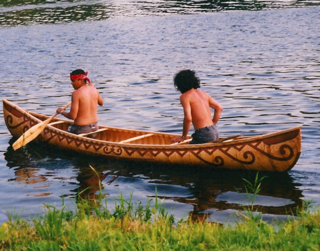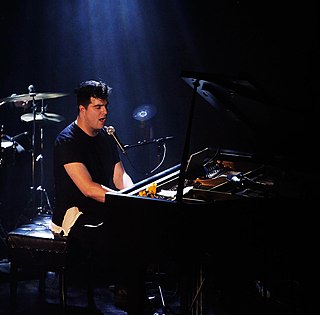Related Research Articles

The Abenaki are Indigenous people of the Northeastern Woodlands of Canada and the United States. They are an Algonquian-speaking people and part of the Wabanaki Confederacy. The Eastern Abenaki language was predominantly spoken in Maine, while the Western Abenaki language was spoken in Quebec, Vermont, and New Hampshire.

The Passamaquoddy are a Native American/First Nations people who live in northeastern North America. Their traditional homeland, Peskotomuhkatikuk, straddles the Canadian province of New Brunswick and the U.S. state of Maine in a region called Dawnland. They are one of the constituent nations of the Wabanaki Confederacy.
Indigenous music of Canada encompasses a wide variety of musical genres created by Aboriginal Canadians. Before European settlers came to what is now Canada, the region was occupied by many First Nations, including the West Coast Salish and Haida, the centrally located Iroquois, Blackfoot and Huron, the Dene to the North, and the Innu and Mi'kmaq in the East and the Cree in the North. Each of the indigenous communities had their own unique musical traditions. Chanting – singing is widely popular and most use a variety of musical instruments.

The Saint John River is a 673-kilometre-long (418 mi) river flowing within the Dawnland region from headwaters in the Notre Dame Mountains near the Maine-Quebec border through western New Brunswick to the northwest shore of the Bay of Fundy. Eastern Canada's longest river, its drainage basin is one of the largest on the east coast at about 55,000 square kilometres (21,000 sq mi). This “River of the Good Wave” and its tributary drainage basin formed the territorial countries of the Wolastoqiyik and Passamaquoddy First Nations prior to European colonization, and it remains a cultural centre of the Wabanaki Confederacy to this day.
The Wolastoqiyik, also Wəlastəkwewiyik, Malecite or Maliseet are an Algonquian-speaking First Nation of the Wabanaki Confederacy. They are the Indigenous people of the Wolastoq valley and its tributaries. Their territory extends across the current borders of New Brunswick and Quebec in Canada, and parts of Maine in the United States.

Tanya Tagaq, also credited as Tagaq, is a Canadian Inuk throat singer, songwriter, novelist, actor, and visual artist from Cambridge Bay (Iqaluktuuttiaq), Nunavut, Canada, on the south coast of Victoria Island.

The history of New Brunswick covers the period from the arrival of the Paleo-Indians thousands of years ago to the present day. Prior to European colonization, the lands encompassing present-day New Brunswick were inhabited for millennia by the several First Nations groups, most notably the Maliseet, Mi'kmaq, and the Passamaquoddy.

The Wabanaki Confederacy is a North American First Nations and Native American confederation of five principal Eastern Algonquian nations: the Abenaki of St. Francis, Mi'kmaq, Maleceet, Passamaquoddy (Peskotomahkati) and Penobscot.
Tobique First Nation is one of six Wolastoqiyik or Maliseet Nation reserves in New Brunswick, Canada.

The Halluci Nation, formerly known as A Tribe Called Red, is a Canadian electronic music group who blend instrumental hip hop, reggae, moombahton and dubstep-influenced dance music with elements of First Nations music, particularly vocal chanting and drumming. Based in Ottawa, Ontario, the group consists of Tim "2oolman" Hill, and Ehren "Bear Witness" Thomas. Former members include co-founder DJ Jon Deck and Dan "DJ Shub" General, who left the band for personal reasons in spring 2014, and was replaced by Hill. Co-founder Ian "DJ NDN" Campeau left the band for health reasons in October 2017, with the band opting to remain a duo for the time being.

The South Slave Divisional Education Council (SSDEC) is the organizational entity responsible for the administration of public schools within the South Slave Region of the Northwest Territories, Canada. Its responsibility includes all schools within the five communities of the South Slave. Specifically, it is responsible for schools in the communities of Fort Resolution, Fort Smith, K'atl'odeche First Nation, Hay River, and Łutselk'e. Given the vast distances between communities, and the relatively small populations, the eight schools of the South Slave range in enrolment from 60 to 250 students. Although considered part of the South Slave Region by other departments of the Government of the Northwest Territories, the communities of Fort Providence and Kakisa are served by the Deh Cho Divisional Education Council and not the SSDEC.

Mihku Paul is a First Nations poet, visual artist, storyteller, and activist. She was born into the Maliseet Nation and she is a member of Kingsclear First Nation in New Brunswick, Canada. Mihku Paul currently resides in Portland, Maine where she teaches creative writing at the Maine Women Writers Collection at the University of New England.

The Houlton Band of Maliseet Indians of Maine (HBMI) is a federally recognized tribe of Maliseet, whose land is along the Meduxnekeag River in Maine, United States. They are headquartered in Littleton, Maine, located in Aroostook County.
Madawaska Maliseet First Nation or St. Basile 10 band is one of six Wolastoqiyik or Maliseet Nations on the Saint John River in Canada. The Madawaska Maliseet First Nation (MMFN) territory is in Northern New Brunswick. The MMFN reserve is located 1.6 km east of Edmundston in the north-western region of New Brunswick. The band membership has 350 people. About 114 members of the MMFN live on the St. Basile no. 10 reserve. They are part of the Saint John River Valley Tribal Council. Family names include Bernard, Cimon, Francis, and Wallace.

The Peace and Friendship Treaties were a series of written documents that Britain signed bearing the Authority of Great Britain between 1725 and 1779 with various Mi’kmaq, Wolastoqiyik (Maliseet), Abenaki, Penobscot, and Passamaquoddy peoples living in parts of what are now the Maritimes and Gaspé region in Canada and the northeastern United States. Primarily negotiated to reaffirm the peace after periods of war and to facilitate trade, these treaties remain in effect to this day.
Elder Doreen Spence is a Canadian indigenous rights activist. She founded several indigenous rights organisations in Alberta and advises international organisations in indigenous rights issues.

The following musical events and releases that happened in 2018 in Canada.
The 2018 edition of the Canadian Polaris Music Prize was presented on September 17, 2018. The gala was hosted by broadcaster Raina Douris.

Jeremy Dutcher is a classically-trained Canadian Indigenous tenor, composer, musicologist, performer and activist, who previously lived in Toronto, Ontario and currently lives in Montréal, Québec. He became widely known for his first album Wolastoqiyik Lintuwakonawa, which won the 2018 Polaris Music Prize and the Juno Award for Indigenous Music Album of the Year at the 2019 Juno Awards.

Wolastoqiyik Lintuwakonawa is the debut album by Canadian composer and tenor Jeremy Dutcher, released in 2018. The album, featuring post-classical rearrangement of traditional First Nations music, was the winner of the 2018 Polaris Music Prize.
References
- 1 2 STU journalism documentaries: Maggie Paul, or a French students quest to learn about Canada's Indigenous people, 1969-12-31, retrieved 2018-10-30
- 1 2 3 Paul, Alexandra (2014-04-05). "In Conversation with... Maggie Paul". Winnipeg Free Press. Retrieved 2018-10-30.
- 1 2 "Indspire Announces 2014 Indspire Award Recipients". www.newswire.ca. Retrieved 2018-10-30.
- ↑ Trapunski, Richard (2018-09-18). "Polaris Music Prize 2018: Five things you missed at Jeremy Dutcher's big night". NOW Magazine. Retrieved 2018-10-30.
- ↑ "Jeremy Dutcher Reclaims a Hidden Past on 'Wolastoqiyik Lintuwakonawa'". exclaim.ca. Retrieved 2018-10-30.